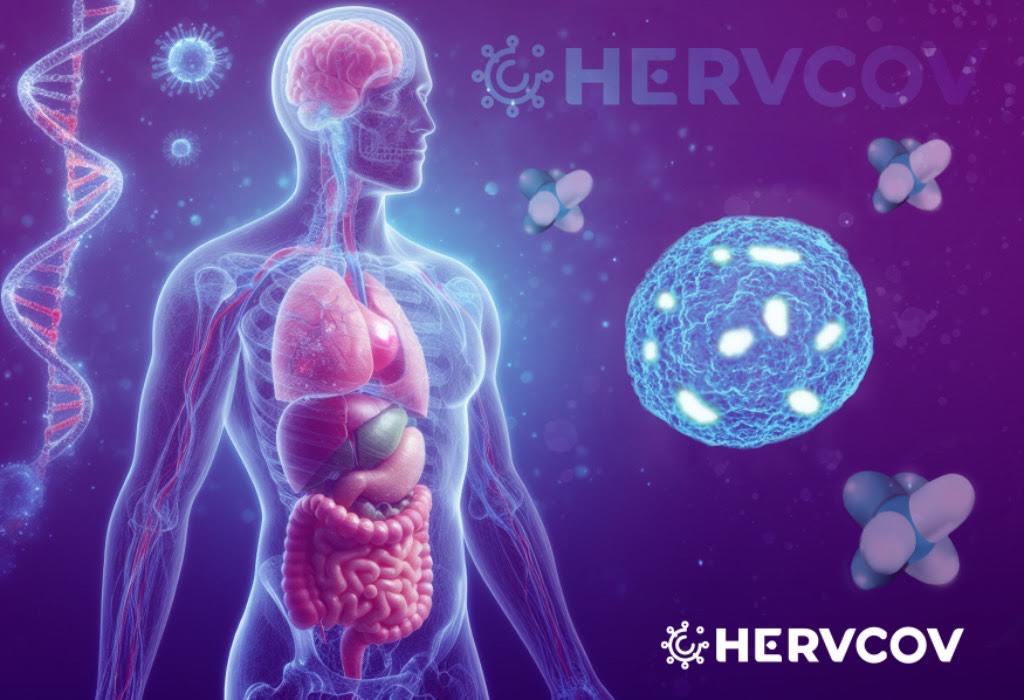hervcov
“Understand the pathogenic role of HERV-W envelope protein and develop novel prognostic markers and therapeutic targets for personalized treatment of COVID-19-associated syndromes”
These are the goals of a project involving researchers from 5 different EU countries. This study has already produced evidence for the induction of a specific protein during COVID-19 disease. New information to guide predictive and personalized medicine may be obtained in the near future thanks to this discovery.
May 20 and 21 2024, Annual Meeting in Zaragoza
Endogenous retroviruses make a stop in Zaragoza

Endogenous retroviruses, very ancient viruses that integrated into human genome, make a stop this month in Spain. They have been intensively studied by researchers from 5 different European countries, within a HERVCOV project, funded by EU Commission. This project is focused on the viral HERV-W-ENV protein, a molecule found to be induced during SARS-CoV-2 infection and present at high levels in the blood of patients with severe COVID-19 and has been associated to “long COVID” disorders.
Last year more than 40 researchers gathered in Rome for the first annual meeting. This year, Zaragoza, the city of one of our partners, will host the second annual meeting of the HERVCOV project, headquarters of the Instituto Aragonés De Ciencias de la Salud (IACS) and IIS Aragón
HERVCOV Project
It is called HERVCOV project, and it has received funding from the European Commission with almost 7 million euros, involving organizations and companies from Italy, Croatia, France, Greece and Spain. The research consortium has been collaborating since almost one year in the study of the protein, which derives from the ENV sequence of human endogenous retrovirus W (HERV-W ENV).
Human endogenous retroviruses (HERVs) currently make up 8% of the human genome. The activation of some HERV sequences has been associated with various physiological and pathological conditions. Consortium research groups have shown that activation of the HERV-W-ENV protein by SARS-CoV-2 is associated with severe forms of COVID-19. On May 5, the World Health Organization ruled the end of the health emergency caused by the COVID-19 pandemic. However, there are still many inflammatory, cognitive and neurological consequences due to SARS-CoV-2 infection, known as Post COVID-19 syndromes.
What is Post COVID-19
The World Health Organization defines “Post COVID-19” as a series of medium- and long-term effects after the initial illness. Symptoms can be different between different people, adults or children. Overall, the most common symptoms of the Post COVID-19 condition include: fatigue, difficulty breathing, memory, concentration or sleep problems, persistent cough, chest pain, difficulty speaking, body aches, sense of smell or taste loss, depression or anxiety.
These symptoms could be associated with persistent inflammation also due to the possibility, not yet clarified, that the SARS-CoV-2 infection may remain in reservoirs located in different parts of the body even for a long time compared to the primary infection.
Research progression
The study on which the HERVCOV project is based demonstrated in COVID-19 patients the high expression of the HERV-W-ENV protein not only at the blood level, but also at the entry site of SARS-CoV-2, i.e. in the nasopharyngeal tract. In fact, HERV-W has already been detected in molecular swabs. Furthermore, HERV-W ENV is persistently expressed even several weeks/months/years after infection in people with Post COVID-19 syndrome. In healthy individuals who have never encountered SARS-CoV-2 and in those who have contracted the virus but have completely recovered, however, the protein is not expressed.
June 8 and 9, Annual Meeting in Rome
On June 8 and 9 there was the first Annual Meeting of the project, during which the researchers of the partnership gathered for conference activities at the Rectorate of the University of Rome “Tor Vergata”.
On June 9 there was also an afternoon dedicated to dissemination hosted in Frascati. Here it has been possible, in addition to visiting the places in the HERVCOV Metaverse, to meet associations involved in scientific dissemination, wear the lab coat and extract the DNA from the fruit, or reproduce the double helix model and discover the differences with the RNA. Researchers of the HERVCOV project were available to answer all questions, furthermore they presented laboratories and quizzes to show the functioning of human endogenous retroviruses.
THE PARTNERS
HERVCOV, “SARS-CoV-2-induced activation of pathogenic endogenous retrovirus envelope HERV-W: towards personalized treatment of COVID-19 patients” is funded under the HORIZON-HLTH-2021-DISEASE call (Personalised medicine and infectious disease: understanding the individual host response to viruses) of the European Commission under the Horizon Europe Framework Programme and it will involve the following partners: Institut National de la Santé et de la Recherche Médicale (France), Ethniko Kai Kapodistriako Panepistimio Athinon (Greece), Rome Tor Vergata University (Italy), Instituto Aragonés de Ciencias de la Salud (Spain), Fundación Agencia Aragonesa para la Investigación y el Desarrollo (Spain), Geneuro Innovation SAS (France), Inserm Transfert (France), Klinicki Bolnicki Centar Rijeka (Croatia) and Frascati Scienza (Italy).
This project has received funding from the European Union’s Horizon Europe research and innovation program under grant agreement No 101057302.